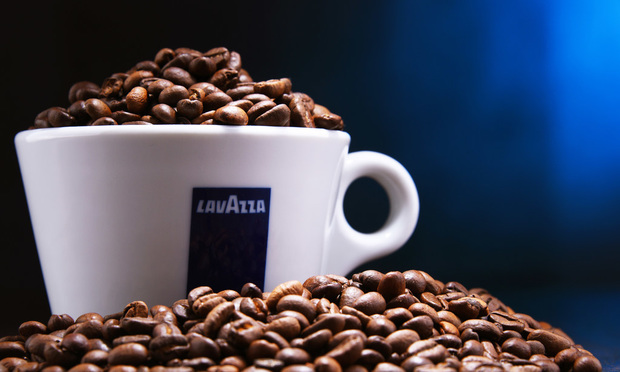Online Reseller Accuses Lavazza Coffee of Bringing Phony IP Infringement Claims
The reseller says it's lawfully permitted to resell Lavazza products without violating the company's intellectual property rights under the first sale doctrine.
November 12, 2019 at 05:56 PM
3 minute read
 Cup of Lavazza coffee, a brand owned by an Italian manufacturer of coffee products that was founded in Turin in 1895 by Luigi Lavazza/courtesy photo
Cup of Lavazza coffee, a brand owned by an Italian manufacturer of coffee products that was founded in Turin in 1895 by Luigi Lavazza/courtesy photo
A New Jersey company that operates an Amazon storefront claims Italian coffee purveyor Lavazza is unlawfully interfering with the online resale of its products, according to a lawsuit filed Tuesday.
The suit filed by LY Berditchev Co. of Passaic says Lavazza is stifling competition by making false reports to Amazon that resellers are violating its intellectual property rights.
The suit says LY Berditchev is lawfully permitted to resell Lavazza products without violating the company's intellectual property rights under the first sale doctrine. That doctrine provides that, once a manufacturer places a product in the stream of commerce through its first sale, it can no longer enforce its intellectual property rights on resellers if the products being sold are authentic and unaltered.
Lavazza is not the only purveyor of goods to find itself in court over the online sale of its products, although the producer of brand-name goods is usually the plaintiff.
In December 2018, retailer Williams-Sonoma sued Amazon in a San Francisco federal court, accusing the online retailer of trading on its goodwill and infringing its intellectual property. In May, a judge denied Amazon's motion to dismiss that case after it cited the first sale doctrine, finding the use of Williams-Sonoma's service mark "plausibly suggest an affiliation with Williams-Sonoma that does not actually exist."
Chanel has filed two suits against operators of fashion resale websites, accusing them of trying to deceive consumers into falsely believing that they are affiliated with Chanel. And in 2010, the U.S. Court of Appeals for the Second Circuit ruled for eBay in a trademark infringement suit brought by Tiffany & Co., which accused the online retailer of selling counterfeit versions of its products.
The LY Berditchev suit was filed by Mark Berkowitz of Amster, Rothstein & Ebenstein in New York. The suit names Milan-based Luigi Lavazza S.p.A. and its American subsidiary as defendants. It seeks a declaratory judgment that LY Berditchev did not engage in trademark infringement or counterfeiting. The suit also accuses Lavazza of making false or misleading representations and engaging in unfair competition, and brings claims of tortious interference with contract and business relations, defamation and trade libel.
LY Berditchev acquires Lavazza products and resells them at a profit. Lavazza has made at least 14 complaints to Amazon that its products sold by LY Berditchev are counterfeit, the suit claims. Amazon suspended the sales of Lavazza products by LY Berditchev in each case, the suit said.
Lavazza was unable to provide any evidence in support of its claims, but nevertheless refused to withdraw those complaints, according to the suit.
"It is well-known among brand owners that Amazon has a policy of acting on virtually any notice of intellectual property infringement, whether legitimate or not," the suit claims. The complaint cites an article from a website called Web Retailer stating that, "Unless you (and possibly your legal team) can prove that the notice claim is false, Amazon considers it valid and actionable. Unfortunately, word is out among potential notice claim abusers that anyone can submit a form."
Lavazza, which has not filed a response, did not respond to a request for comment.
This content has been archived. It is available through our partners, LexisNexis® and Bloomberg Law.
To view this content, please continue to their sites.
Not a Lexis Subscriber?
Subscribe Now
Not a Bloomberg Law Subscriber?
Subscribe Now
NOT FOR REPRINT
© 2025 ALM Global, LLC, All Rights Reserved. Request academic re-use from www.copyright.com. All other uses, submit a request to [email protected]. For more information visit Asset & Logo Licensing.
You Might Like
View All
Amazon's Audible Hit With Privacy Class Action Over Use of Tracking Pixels

Suit Claims Amazon Violates Workers' Privacy With Unauthorized Medical Inquiries
5 minute read
Calling It Unconstitutional, Companies Sued Over Daniel's Law Want It Struck Down
5 minute read
Too Fast? Personal Injury Suit Puts Spotlight on Amazon's Delivery Quotas
4 minute readTrending Stories
- 1Thursday Newspaper
- 2Public Notices/Calendars
- 3Judicial Ethics Opinion 24-117
- 4Rejuvenation of a Sharp Employer Non-Compete Tool: Delaware Supreme Court Reinvigorates the Employee Choice Doctrine
- 5Mastering Litigation in New York’s Commercial Division Part V, Leave It to the Experts: Expert Discovery in the New York Commercial Division
Who Got The Work
J. Brugh Lower of Gibbons has entered an appearance for industrial equipment supplier Devco Corporation in a pending trademark infringement lawsuit. The suit, accusing the defendant of selling knock-off Graco products, was filed Dec. 18 in New Jersey District Court by Rivkin Radler on behalf of Graco Inc. and Graco Minnesota. The case, assigned to U.S. District Judge Zahid N. Quraishi, is 3:24-cv-11294, Graco Inc. et al v. Devco Corporation.
Who Got The Work
Rebecca Maller-Stein and Kent A. Yalowitz of Arnold & Porter Kaye Scholer have entered their appearances for Hanaco Venture Capital and its executives, Lior Prosor and David Frankel, in a pending securities lawsuit. The action, filed on Dec. 24 in New York Southern District Court by Zell, Aron & Co. on behalf of Goldeneye Advisors, accuses the defendants of negligently and fraudulently managing the plaintiff's $1 million investment. The case, assigned to U.S. District Judge Vernon S. Broderick, is 1:24-cv-09918, Goldeneye Advisors, LLC v. Hanaco Venture Capital, Ltd. et al.
Who Got The Work
Attorneys from A&O Shearman has stepped in as defense counsel for Toronto-Dominion Bank and other defendants in a pending securities class action. The suit, filed Dec. 11 in New York Southern District Court by Bleichmar Fonti & Auld, accuses the defendants of concealing the bank's 'pervasive' deficiencies in regards to its compliance with the Bank Secrecy Act and the quality of its anti-money laundering controls. The case, assigned to U.S. District Judge Arun Subramanian, is 1:24-cv-09445, Gonzalez v. The Toronto-Dominion Bank et al.
Who Got The Work
Crown Castle International, a Pennsylvania company providing shared communications infrastructure, has turned to Luke D. Wolf of Gordon Rees Scully Mansukhani to fend off a pending breach-of-contract lawsuit. The court action, filed Nov. 25 in Michigan Eastern District Court by Hooper Hathaway PC on behalf of The Town Residences LLC, accuses Crown Castle of failing to transfer approximately $30,000 in utility payments from T-Mobile in breach of a roof-top lease and assignment agreement. The case, assigned to U.S. District Judge Susan K. Declercq, is 2:24-cv-13131, The Town Residences LLC v. T-Mobile US, Inc. et al.
Who Got The Work
Wilfred P. Coronato and Daniel M. Schwartz of McCarter & English have stepped in as defense counsel to Electrolux Home Products Inc. in a pending product liability lawsuit. The court action, filed Nov. 26 in New York Eastern District Court by Poulos Lopiccolo PC and Nagel Rice LLP on behalf of David Stern, alleges that the defendant's refrigerators’ drawers and shelving repeatedly break and fall apart within months after purchase. The case, assigned to U.S. District Judge Joan M. Azrack, is 2:24-cv-08204, Stern v. Electrolux Home Products, Inc.
Featured Firms
Law Offices of Gary Martin Hays & Associates, P.C.
(470) 294-1674
Law Offices of Mark E. Salomone
(857) 444-6468
Smith & Hassler
(713) 739-1250






